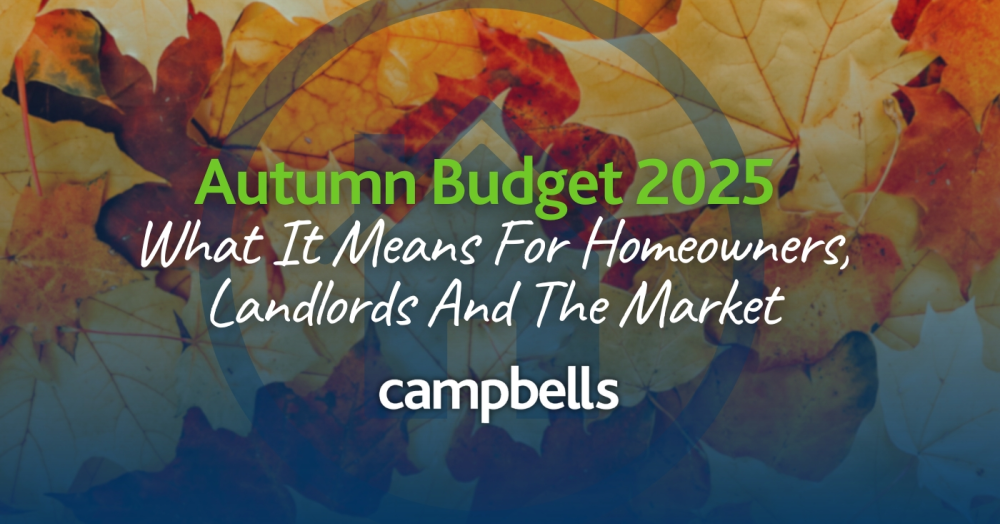With the 2025 Autumn Budget now confirmed, there are a few changes ahead for the property market. Whether you’re planning to sell, buy, rent out, or just keeping tabs on your home’s value — here’s what you need to know.
🏡 New “Mansion Tax” on High-Value Homes
From April 2028, properties valued at over £2 million will face an annual surcharge on top of council tax — a tax that’s been dubbed the “mansion tax”.
The surcharge will be structured in bands:
- £2.0 M–£2.5 M → £2,500 per year
- £2.5 M–£3.5 M → £3,500 per year
- £3.5 M–£5.0 M → £5,000 per year
- Over £5.0 M → £7,500 per year
According to recent data, fewer than 0.5% of all home sales this year have been for properties with an asking price above £2 M. Around 1% of homes currently for sale exceed this threshold.
Already, sales agreed for homes above £2 M are down 13% year-on-year, suggesting the market has started reacting to speculation — even before the policy is implemented.
As our team at Campbells, we anticipate this surcharge could significantly affect demand at the very top end of the market, potentially depressing values for premium homes and slowing movement among high-worth sellers.
While the immediate impact will be concentrated on a small fraction of properties, there may be a knock-on effect across the broader market. When high-end buyers and sellers pull back, it can ripple out — reducing activity and confidence for all segments.
📉 Stamp Duty — For Now, No Change
Despite widespread speculation in recent months, the Budget did not include any changes to Stamp Duty Land Tax (“stamp duty”).
For those weighing up a move now — that’s one variable off the table. The stamp duty system remains as is, which for many still represents a significant one-off cost when buying.
🏠 Landlords: Higher Tax on Rental Income
For those letting properties, the Budget brings change too. From April 2027, income tax on rental income rises by 2%. That means the basic, higher and additional property income tax rates will become 22%, 42% and 47% respectively.
What this means in practice:
Landlords may see reduced net returns — potentially prompting some to raise rents to offset the increased tax burden.
Those with smaller portfolios or modest rental yields may find letting less viable — which could lead some to exit the buy-to-let market.
As your estate agents, we recognise this may reduce rental supply over time, which could push up demand — and rents — for good-quality rental homes. But that depends on how many landlords feel forced to leave the market.
⏳ What About Timing — When Will It Bite?
The mansion tax surcharge does not kick in until April 2028.
The higher tax on rental income takes effect from April 2027.
In short: there is time to plan. Whether you own a high-value home, rent out property, or are considering buying — this window enables reflection and decision-making before the changes take hold.
What This Means for Buyers, Sellers and Renters — Our View at Campbells
If you’re thinking of selling a home valued above £2 million, it might be worth acting sooner rather than later — market interest at the top end is already softening.
For first-time buyers or those moving into sub-£2 million homes, the absence of stamp duty changes offers some stability in what remains a volatile market.
Landlords need to run new numbers on rental yields — and be ready for potential rent increases or a shift away from buy-to-let altogether.
For renters, reduced supply might mean stiffer competition — but also more demand for well-presented, well-managed homes from landlords who stay in the market.
At Campbells, we believe that clarity — even when it brings change — is better than weeks of uncertainty. With the Budget now delivered, those who move confidently and sensibly will be in a stronger position.
If you’re considering selling, buying, or letting, and want insight into how these changes might affect you or your property — get in touch. We’re here to help you navigate the new landscape with as little disruption as possible.
🔍 Northamptonshire Market Summary
Here in Northamptonshire — particularly around Daventry and the surrounding villages — we expect the market to remain resilient. The new high-value home surcharge will only affect a small number of premium properties locally, while the vast majority of homes should continue to see steady demand, especially in the £250k–£500k range.
Rental changes may put pressure on landlords, which could reduce rental supply and increase competition for well-located homes near good schools and transport links.
Overall, our region’s strong connectivity, desirable village lifestyle, and relative affordability compared with neighbouring counties mean the local outlook remains positive.
Source: rightmove.co.uk/news/articles/property-news/autumn-budget-2025-housing-market-property-taxes
